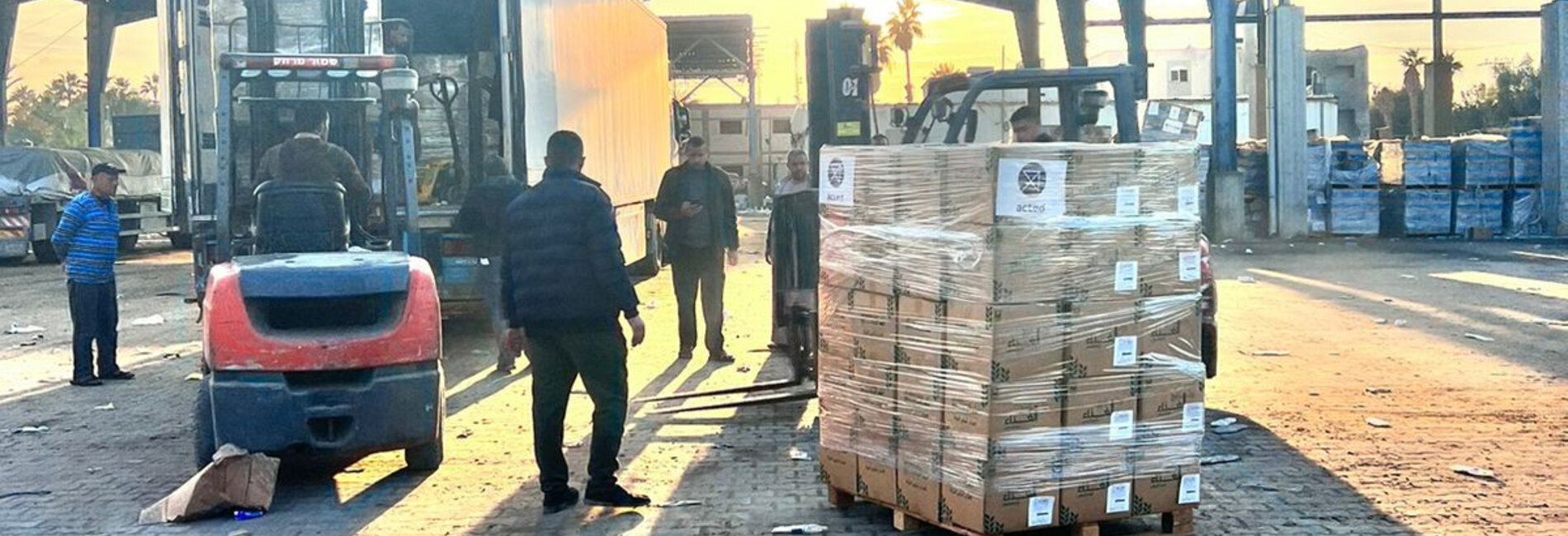Pooled funds work with Palestinian and international partners to save lives
In Dier Elbalah, Mahmoud is sheltering with his children in a tent. He and his wife regularly skip meals. “We eat less so the kids can eat at least one meal a day.”
Six months into the hostilities, and as intense bombardment continues, people in Gaza continue to face hunger, trauma, and unsafe living conditions.
People are hungry.Some 1.1 million Gazans are now experiencing catastrophic hunger – a number that has doubled in three months.
People have lost their homes: 1.7 million people are displaced.
People face a health and sanitation crisis. Across displacement sites, there is an average of one toilet for every 700 people.
In Rafah, Eman and thousands of others wait just to take care of basic needs. “I have to wait two hours to use the bathroom. The line is very long,” she explains. It is particularly difficult for her four children to deal with this.
Pooled funds support our partners to save lives
The Central Emergency Response Fund responded to the crisis with a US $12 million Rapid Response allocation and a further $6.7 million Underfunded Emergencies allocation, both in October. CERF funding is supporting routine vaccination for children, medical care for pregnant women and babies, protection, food assistance, shelter and household basics, and other life-saving activities.
At the same time, Palestinian and international partners of the OPT Humanitarian Fund have been delivering immediate food, shelter, health, water, and other assistance since the fighting began. Since 7 October, the OPT HF has disbursed some $50 million to respond to urgent needs in Gaza, with further allocations planned soon.
Addressing hunger is a top priority
CERF funding helped WFP deliver ready-to-eat food packages for Mahmoud and his children.
The variety was welcome. “When the food parcel came, my mother said she’d change the lunch plans to include green beans, which the kids were craving,” Mahmoud said. Until then, the family had eaten only rice.
This food delivery was enough to last the family fifteen days.
In Rafah, ACTED and their Palestinian partners ‘Unlimited Friends Association for Development’ and Feres Al-Arab used money from the OPT Humanitarian Fund to distribute emergency food – both cooked food and staple supplies – to people sheltering in community centers.
They focused on reaching the most vulnerable people including women, children, the elderly, and people with disabilities, with the emergency parcels.
Also in Rafah, OPT HF partners Oxfam Novib and PEF worked together to deliver emergency household supplies, including jerry cans for water storage , pillows and bedding; while Première Urgence Internationale (PUI) and the Palestinian Agricultural Relief Committees (PARC) distributed vegetable baskets, ready-to-eat food, and hygiene packages for displaced people.
Water, sanitation, and shelter
With millions of people on the move and living in informal shelters addressing water and sanitation needs – like those Eman described – is critical.
With funding from CERF and other donors, UNICEF is providing emergency water trucking and mobile latrines in the worst affected areas.
Our partners are also helping keep overcrowded living spaces clean. In Khan Younis, OPT HF partner ‘WeWorld’ organized community cleaning campaigns – including trash collection and disposal – in under-served displacement sites, to help create a safer environment.
Published 9 April 2024, reflecting aid provided by partners since October 2023
Includes information from original stories from UNICEF and WFP.
More information on the oPT Humanitarian Fund: https://www.ochaopt.org/page/opt-humanitarian-fund
More information on the CERF Allocations: Rapid Response and Underfunded










